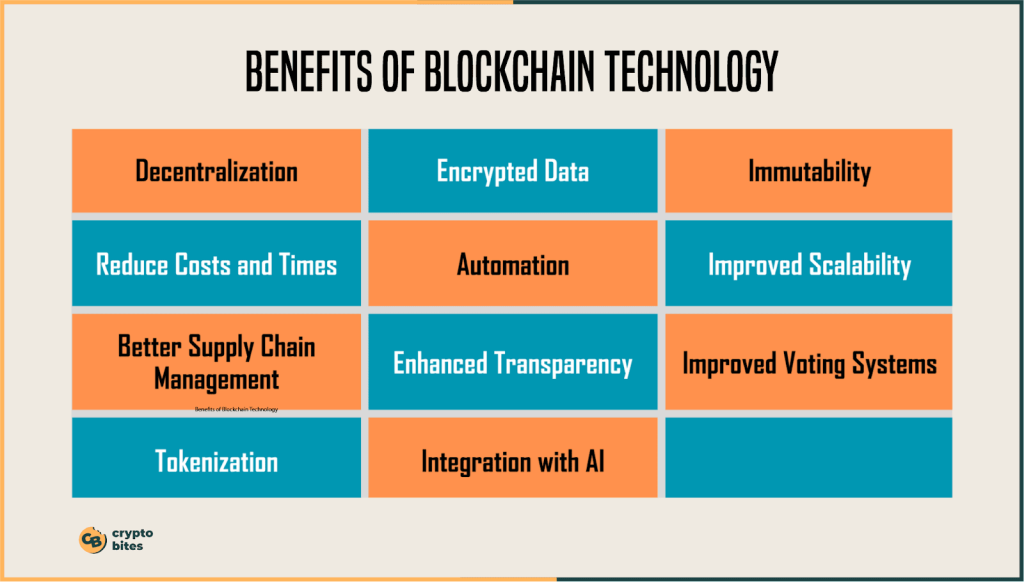
11 Major Benefits of Blockchain Technology
Thinking about switching from traditional ledger systems to a more secure technology for data storage? Blockchain technology is probably the only option that may come to your mind. Its potential applications are vast, and its benefits are far-reaching.
So, what are the benefits of blockchain technology? In short, blockchain technology allows for decentralized and secure data storage. It also enables efficient transactions and transparent record-keeping.
In the upcoming years, blockchain technology will revolutionize how we interact with data. The integration of AI will further improve its data processing and analysis capabilities. It will make it an even more powerful tool for businesses.
Continue reading for more information on the current and potential advantages of blockchain technology.
Key Takeaways:
- Blockchain technology and its applications
- Major Benefits of blockchain technology in the present and future
- Blockchain technology with AI integration
- Basic guidelines to enter the blockchain technology
- More queries on blockchain technology
Blockchain Technology and Its Application
Before digging into the benefits, let’s first define blockchain technology and its applications.
Blockchain technology is essentially a digital ledger that records data (e.g., transactions) across a distributed network of computers. This decentralized architecture ensures that no single entity controls the entire chain. This feature makes it inherently resistant to fraud and corruption.
Each ‘block’ within the chain contains several transactions.
Every time a new transaction is made, a transaction record is added to every participant’s ledger. This is confirmed through a process known as “Consensus.”
What is Consensus? Consensus is the process of reaching an agreement on the validity of transactions. Only after consensus is reached can the transactions be added to the blockchain. It ensures that tampering with the transactional information is next to impossible once a block has been added to the blockchain.
Major Applications of Blockchain Technology
Described in 1991 and invented in 2008, blockchain technology was initially associated only with cryptocurrency. However, in the last few years, it has been recognized for its broad potential beyond just financial applications.
The major applications of blockchain technology include:
- Cryptocurrencies: Cryptocurrency represents the most renowned and extensively adopted implementation of blockchain technology. A report says over 300 million people, or 3.9% of the world population, use blockchain for cryptocurrency. Bitcoin, Ethereum, and Litecoin are among the notable examples.
- NFTs: Non-fungible tokens (NFTs) are digital assets. They represent ownership of unique items such as art, music, and collectibles. These tokens are securely stored on the blockchain.
- Provenance Tracking: Blockchain can create immutable records of the production, shipment, and receipt of products. All these are parts of digital supply chain management.
- Digital IDs: Blockchain can provide a secure and unforgeable method of personal identity verification. It could be used for everything, from passports to online account logins. Also, it eliminates the need for third-party verification.
- Decentralized Cloud Storage: Blockchain-based cloud storage is inherently secure due to its decentralized architecture. Users can store their data on multiple nodes across the network. So, the data will always be available, even if one or more nodes go offline.
- Smart Contracts: Smart contracts are self-executing digital agreements. The contract’s terms are written directly into the code. They automatically enforce these terms without any middlemen or third-party involvement.
- Real Estate: Blockchain technology can be used to simplify real estate transactions. It also allows for secure, transparent record-keeping of property ownership, titles, and contracts.
- Data Sharing & Collaboration: Blockchain technology allows secure sharing and collaboration of sensitive data among different parties. There is no fear of data breaches or tampering.
- Healthcare: Blockchain can provide secure and efficient storage of patient medical records. It ensures data integrity and accessibility for healthcare professionals.
- Gaming: Blockchain technology can create a more secure and transparent environment for digital gaming. It does so by eliminating cheating, fraud, and counterfeit items. It can be anything from in-game currencies to virtual assets and collectibles.
- Food Safety: Traceability is a major concern when it comes to food safety. Blockchain technology can track food products from farm to table. This ensures transparency and accountability throughout the supply chain.
11 Major Benefits of Blockchain Technology
Now, you have a basic understanding of the major use cases of blockchain technology. So, it’s time to learn about the top 11 benefits of this powerful technology.

1. Decentralization
Decentralization is a fundamental and defining characteristic of blockchain technology. It offers several notable benefits:
- Elimination of central authority and control
- Accessible from anywhere
- No single point of failure
- Decreased vulnerability to data breaches and hacks
To better grasp its advantages, consider the example of traditional banking. In traditional banking, a central authority (such as a bank) holds power over all transactions and account balances.
In contrast, blockchain technology ensures that each participant possesses a copy of the ledger. Thus, it’s impossible for any single entity to manipulate the system.
2. Encrypted Data
Blockchain technology utilizes sophisticated encryption techniques to ensure data security. This means that only authorized users with the right keys can access the data. The utilization of such encryption offers several advantages:
- Enhanced security and privacy
- Minimized risk of data breaches or tampering
Each block within the chain contains a cryptographic hash of the preceding block. Any attempt to manipulate previous records would be promptly detected by other network participants.
3. Immutability
Once a block has been added to the blockchain, it cannot be altered or deleted. It also provides additional benefits-
- Ideal for record-keeping and audit trails, as all transactions are permanently recorded on the ledger
- Ensures transparency and accountability
- No data loss
Understand the immutability of blockchain technology with an example. Suppose an employee at a company tries to alter financial records. In traditional systems, it’s easy for the employee to manipulate data without getting caught. But in blockchain, once a block has been added, it cannot be altered or deleted. Therefore, the tampering attempt would be easily detectable and prevented by other network participants.
4. Reduce Costs and Times
Blockchain technology eliminates the need for intermediaries or third parties, leading to reduced transaction costs. According to a report, there is a strong likelihood that financial institutions and banks can achieve a 30% reduction in infrastructure costs by leveraging blockchain technology.
Additionally, blockchain technology reduces the time and effort required to verify transactions. This streamlines business processes.
For example, in traditional international money transfers, multiple intermediaries (banks) are involved. This results in high fees and longer processing times. However, blockchain technology simplifies the process and can be completed at a fraction of the cost.
Due to the fast processing and less cost, many large companies have started using blockchain technology. This trend is likely to continue in the future. The market is being a huge opportunity of the investors.
According to a forecast by Statista, worldwide spending on blockchain solutions is projected to reach nearly $19 billion by 2024.

Additionally, Gartner estimates that by 2030, the technology could generate a business value of approximately $3.1 trillion, potentially governing 10% to 20% of the global economic infrastructure with blockchain-based systems.
5. Automation
Blockchain technology enables automation through smart contracts.
To illustrate, let’s consider a real estate transaction. In traditional systems, buyers and sellers rely on intermediaries such as banks or lawyers to ensure agreement conditions are met. This process is both time-consuming and costly.
However, with blockchain technology, smart contracts can automatically execute agreements once all conditions are met. This eliminates the need for intermediaries and automates the process, resulting in significant time and cost savings for all parties involved.
The following are some benefits of automation:
- Reduced manual effort and human error
- Cost-effective
- Time-saving
- Increased efficiency and accuracy
6. Improved Scalability
In blockchain technology there are no centralized servers. So, as the network grows, this makes it easier to scale up.
Additionally, blockchains can process a higher volume of transactions per second (TPS) without compromising on security. They do this by using sharding techniques or layer two solutions.
7. Better Supply Chain Management
Blockchain technology provides end-to-end traceability in supply chain management. It allows businesses to track products from the source to the end consumer. The whole mechanism provides so many additional benefits-
- Helps identify inefficiencies and potential recalls
- Reduces risk of counterfeit products
- Increases customer satisfaction
For instance, in the case of food safety, blockchain can trace contaminated produce back to its source. This minimizes the spread of infections or diseases.
8. Enhanced Transparency
The transparency of blockchain technology is unparalleled. This is primarily because each network participant has a complete and consistent version of the ledger. This characteristic is especially advantageous for processes that require accountability. Additional advantages include:
- Every transaction is traceable.
- It fosters ethical business practices and discourages deceitful behavior.
- Investors and stakeholders can have a greater level of confidence.
9. Improved Voting Systems
In online voting, verifying identity and ensuring the integrity of results can be a challenge. With blockchain technology, voting systems can be secure by ensuring every vote is recorded on the immutable ledger.
Plus, it eliminates the possibility of duplicate votes or tampering with results. This makes elections more transparent and fair.
10. Tokenization
Tokenization on the blockchain refers to the conversion of tangible and intangible assets into digital tokens. It represents ownership or a right to an underlying asset. These digital tokens are securely recorded, managed, and transacted on a blockchain platform. The benefits of tokenization are multifaceted and significant:
- Increases liquidity of assets that are usually hard to divide or trade.
- Opens up investment opportunities to a wider audience by allowing fractional ownership.
- Enhances the speed and efficiency of transactions by eliminating intermediaries.
- Provides a new level of transparency and security with every transaction being verified and recorded on the blockchain.
- Allows for the creation of new types of tokens, such as utility, security, or non-fungible tokens (NFTs). Each with distinct characteristics that can serve different use cases.
11. Integration with AI
The future will likely see blockchain technology integration with artificial intelligence (AI). AI can analyze vast amounts of data generated by blockchain systems. This provides valuable insights and improves decision-making processes.
In a later discussion, you will know where blockchain technology may reach with AI in the future.
Blockchain Technology with AI
The convergence of blockchain technology and artificial intelligence (AI) holds promise for numerous industries. It offers advanced efficiency, security, and data management. Here are detailed points on how integrating these two technologies could benefit systems and applications:
- Autonomous Monitoring of Transactions:AI can continuously analyze transaction patterns on the blockchain to detect anomalies or fraudulent activities. It ensures a higher level of security against illicit actions.
- Predictive Analysis: AI can predict trends and behaviors within the blockchain network through machine learning algorithms. It allows for proactive decision-making and strategic planning.
- Improved Data Management: AI can intelligently categorize, process, and interpret the extensive data residing on blockchains. It can be extremely beneficial for industries like healthcare, finance, and logistics.
- Energy-Efficient Consensus Mechanisms: AI-driven consensus mechanisms can potentially replace resource-intensive processes like Proof of Work. It leads to more sustainable and environmentally friendly blockchain networks.
- Enhanced Smart Contracts: AI can create smarter, self-learning contracts. They adapt to new information or conditions within the blockchain. This provides more dynamic and responsive contract functionality.
- Better User Experience: AI can analyze blockchain operations. It can then provide recommendations to improve user interface design. This enhances the overall user experience for those interacting with blockchain-based platforms.
- Integrated IoT Operations: In an Internet of Things (IoT) enabled world, AI can manage and securely automate transactions between devices on a blockchain network. This leads to seamless M2M (machine-to-machine) communications.
- Regulatory Compliance Monitoring: AI tools can track changes in regulatory standards. They can automatically adjust the blockchain network’s operations to maintain compliance. This reduces the burden on organizations.
The synergy between AI and blockchain is poised to create intelligent networks. These networks will be resilient, transparent, and self-optimizing.
The above points highlight the broad spectrum of possibilities. These powerful technologies could come to fruition when they work together.
What Do I Need to Know to Enter Blockchain Technology?
Knowing all the benefits of blockchain technology is not enough until you know the steps you can take to enter this field.
Here are a few pointers to get you started on your journey in blockchain technology:
- Understand the Basics: Knowledge of blockchain and its workings is foundational. Recognize its key components. These include distributed ledger technology, consensus algorithms, and smart contracts.
- Learn about cryptocurrencies: Many blockchains underpin cryptocurrencies. Understanding Bitcoin, Ethereum, and other major cryptocurrencies will be beneficial.
- Programming Skills: Acquire skills in programming languages commonly used in blockchain development, such as Solidity, Java, or Python.
- Know the Platforms: Familiarize yourself with blockchain platforms. Ethereum, for instance, is a popular choice for developing decentralized applications (dApps).
- Smart Contract Development: Learn how to write, deploy, and test smart contracts, which are self-executing contracts with the terms directly written into code.
- Blockchain Security: Understand the security principles behind blockchain. This includes the importance of cryptography and secure application development.
- Decentralized Applications (dApps): Learn how dApps work on a technical level. Understand their differences from traditional web apps.
- Network and Join the Community: Engage with the blockchain community through forums and social media. Attend industry events to stay updated on the latest trends and technologies.
- Understand the Regulatory Environment: Regulations around digital assets are evolving. Keeping up with the legal and compliance aspects is crucial.
- Continuous Learning: The blockchain field is rapidly advancing. Commit to ongoing education to keep pace with new developments, tools, and practices.
By focusing on these points and diving deep into each one, you’ll be better prepared to enter the rapidly evolving world of blockchain technology.
Conclusion
I hope you now have enough ideas on how blockchain technology is transforming businesses. It can be integrated with AI to unlock even more potential.
The benefits of adopting these technologies are limitless. They include automating processes, reducing costs, and ensuring transparency. They also encompass predicting trends and improving user experience.
Continuous advancements and innovations in this field make it an exciting time for businesses. They’re looking to stay ahead of the curve.
We are moving towards a more decentralized and data-driven future. Embracing blockchain technology and its synergies with AI will play a crucial role in shaping our digital landscape.
FAQs
Why is Blockchain Technology important?
Blockchain technology is important because it offers a secure, transparent, decentralized way to store and manage data. It eliminates the need for intermediaries, speeds up transactions, and reduces costs.
Is it possible to manipulate blockchain transactions?
It is nearly impossible to manipulate a blockchain transaction. This is due to its decentralized and distributed nature. Each block in the chain contains a cryptographic hash of the previous block. This makes it nearly impossible to alter or tamper with past transactions.
What is the future of Blockchain Technology?
The future of blockchain technology is bright and full of potential. More industries are adopting this technology. We can expect advancements in areas like supply chain management, data storage, healthcare, finance, and more.
Additionally, AI integration is expected to make blockchain more efficient and versatile.




